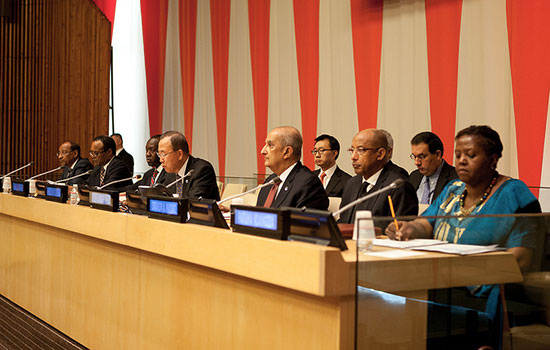
Secretary-General Ban Ki-moon (centre) addresses the high-level panel discussion, “Africa’s innovation in governance through 10 years of the African Peer Review Mechanism (APRM).” Photo: Africa Renewal/Bo Li
For more photographs, visit the Africa Renewal Flickr page, here.
African Peer Review Mechanism working for the peoples of Africa: a decade of self-assessment
Background
The African Peer Review Mechanism (APRM) was established on 9 March 2003 by the Heads of State and Government Implementation Committee (HSGIC) of the New Partnership for Africa’s Development (NEPAD) as an instrument for self-monitoring for better governance.
The APRM has, at its fulcrum, the deepening of democratic practices, with a view to strengthening achievements, disseminating best practices and rectifying underlying deficiencies in governance and socio-economic development processes among AU Member States. The aim is to encourage and build transformative leadership and constructive national dialogue, through an inclusive and participatory self-assessment process, and foster policies and practices that would lead to the attainment of the NEPAD objectives of political stability, high economic growth, sustainable development and accelerated sub-regional and continental economic integration.
New Partnership for Africa's Development
Background
The New Partnership for Africa's Development (NEPAD), an African Union strategic framework for pan-African socio-economic development, is both a vision and a policy framework for Africa in the twenty-first century. NEPAD is a radically new intervention, spearheaded by African leaders, to address critical challenges facing the continent: poverty, development and Africa's marginalisation internationally.
NEPAD provides unique opportunities for African countries to take full control of their development agenda, to work more closely together, and to cooperate more effectively with international partners.

